|
Update: One of the WP leaders/interpreters in Pakistan reports that he received information from an attorney in Pakistan that as of midnight (Central Time) last night that the threat of martial law is now over. The neighboring Muslim nations of Saudi Arabia and UAE will come to the aid of Pakistan and loan them the money to pay off their debt to the IMF (International Monetary Fund). Here is an article with more information about these loans to Pakistan from Saudi Arabia & UAE from January 12, 2023.
Source: https://www.aljazeera.com/news/2023/1/12/uae-extends-existing-loan-and-offers-new-one-to-ally-pakistan (Dubai is the most populous city in the United Arab Emirates and the capital of the Emirate of Dubai, the most populated of the 7 emirates of the United Arab Emirates.) "UAE pledges $3bn loan to help cash-strapped ally Pakistan: The existing loan of $2bn will be topped with an additional loan of $1bn, a statement by the Pakistani prime minister’s office says." Source: https://www.aljazeera.com/news/2023/1/12/uae-extends-existing-loan-and-offers-new-one-to-ally-pakistan "Former finance minister Miftah Ismail has said that if an agreement is reached with the International Monetary Fund (IMF) and foreign investments start to come in then the dollar may also decline." Source: https://dunyanews.tv/en/Pakistan/694118- Thank you for your prayers and support over the last few days based on the information that we received from a leader and interpreter in Pakistan.
0 Comments
"The possibility of tax on transactions of Rs 50,000 per day from the bank has been revealed. According to sources, tax proposals are being worked on in the Ministry of Finance to meet the conditions of the IMF. Withholding tax may be levied on bank transactions of more than Rs 50,000 per day.
It has been learned that the proposed tax will not be applicable on the persons included in the list of active tax payers, while the FBR authorities have estimated the revenue of Rs 45 to 50 billion from the imposition of withholding tax on non-filers. It has been reported that some other proposals for the proposed Presidential Ordinance on the increase in taxes are also being worked on." This may have an impact on the Winning Pakistan ministry. Withholding tax may be levied on bank transactions of more than Rs 50,000 [US$190.06] per day. Please join us in prayer for Pakistan during these uncertain times. Source: Developing Pakistan https://www.facebook.com/WinningPakistan/posts/pfbid0CY7Xj4QesLVfMjxF7SzAU7az1yTRuvGEE8iqQYcoG691xT3vB94TJw9UA5p1arR7l "Former finance minister Hafiz Pasha warned that Pakistan’s inflation can skyrocket to 70% in case of default. Even if the International Monetary Fund’s (IMF) loan is revived, inflation will still rise to at least 35%, owing to the lender’s strict conditions.
Addressing members of the Pakistan Industrial and Traders Associations Front (PIAF) on Tuesday, Pasha forecasted that Pakistan’s overall economy is likely to remain in severe stagflation in 2023. “If the government implements the key reforms agreed with the IMF, including a Rs50 levy per litre on POL, an electricity tariff hike of 40%, doubling of the gas tariff, and shift to market-based exchange rate policy, the inflation rate could exceed 35%,” he cautioned. If the government does not implement the agreed reforms, he said, “It will lead to a termination of the IMF programme and will virtually dry-up the country’s capital.” “Our reliance on expensive foreign loans has proven to be disastrous. In the first 65 years, the country’s debt was $65 billion. This jumped to almost $130 billion in the next seven years as we enhanced our reliance on high interest loans that are difficult to payback,” he highlighted." An attorney told one of our Pakistan leaders that martial law is going to be declared within days if Pakistan defaults. Please pray for the people in Pakistan. Either way, the Pakistan economy is going to take a hit and it will be more expensive to provide aid to our brothers and sisters in Pakistan. If you are able, please consider donating to our brothers and sisters in Pakistan before the bank transfer taxes are implemented and before inflation sky rockets in Pakistan. Thank you for the recent emergency donations that were made over the last 24 hours based on this news. May Yah bless you for your kindness and compassion. Source: Startup Pakistan https://www.facebook.com/WinningPakistan/posts/pfbid02u6As9vsja3sGU7MDPLLodrKxsovfY2nxWXgE5WWsJ8AobXYbCRZfCRSgohfVUYxil A speaker is needed for large outdoor bible studies. A speaker is $45. Please join us in prayer that Yahuah would supply the funds for this need. Thank you for your support and prayers.
A canopy is needed for bible studies that are held outdoors. They wish to protect the students from rain and snow in the cold season and sun in the hot season. A new canopy is $500. Please pray that Yahuah would provide for His children and meet all of their needs. Thank you for your prayers and support!
Villages in Pakistan need 20 bibles. Urdu Bibles are $8/each, so they need a total of $160. in Urdu Bibles at this time. Please pray that Yahuah would provide His new children with His Word. There are children that need Winter Clothing because they are getting sick while enduring cold temperatures with no heat and/or electricity in their homes, and no warm clothing. Please join us in Prayer that Yahuah would supply His children with the warm clothing that they need. Thank you for your prayers and support.
Between June and October 2022, Pakistan had unprecedented floods. Cropland and villages still remain under water, and almost 10 million children remain in need of immediate critical support. One of our small-scale farms was directly impacted by the floods. The land was flooded and they were unable to harvest crops due to the floods in 2022. Please pray that Yahuah would bless the land, protect it from further flooding and that He will meet their needs. The goal was to implement permaculture practices, methods and design on small-scale farms which will provide sustainable food security, self-sufficiency, and abundance to the communities that we serve. The small-scale farms will help eliminate hunger, food insecurity and malnutrition. We purchased (4) 25'x25' plots & we leased (4) plots where villagers have grown a variety of vegetables, fruit and wheat. The food grown on the farms is donated to families in the surrounding villages.
Current reported estimates in January 2023 are: as many as 4 million children in Pakistan are still living near contaminated and stagnant flood waters. This is dangerous to their health. "They are frail, hungry, children are fighting a losing battle against severe acute malnutrition, diarrhoea, malaria, dengue fever, typhoid, acute respiratory infections, and painful skin conditions." "Hundreds of thousands of homes and numerous public health facilities, water systems and schools have been destroyed or damaged." Source: http://www.unicef.org/.../devastating-floods-pakistan-2022. Accessed 22 Jan. 2023. Our villages that were impacted by the Pakistan Floods in 2022 still need clothing and school items for their children. Please join us in prayer that Yahuah would supply their needs. We have only raised $200 out of the $2,100 that is needed. We still need $1,900 to help the children. Thank you! There was a small amount of money left over from the purchase for the heaters for the leaders in Pakistan. This amount was used to purchase a rug pad to go under the rug in the Worship Center which covers a concrete floor. This Worship Center is where the sewing classes are held. We know the ladies will be very happy to have a rug pad for the concrete floor where they sit to take sewing classes. Thank you for your kindness and compassion for our Pakistani brothers and sisters. Thanks and Praise to Yahuah!
Thank you for the generous donations for a water filter, heaters and blankets for our leaders in Pakistan. The cold season in Pakistan lasts for 2.5 to 3 months, from December to February, with an average daily high temperature below 73°F. The coldest month of the year in Lahore is January, with an average low of 47°F and high of 66°F. This week in Lahore, highs are in the 50's F and lows are in the 30's F. That might not seem very cold to some in North America, however, the people in Pakistani villages live in brick homes, most have dirt floors, some homes do not have windows, most villagers do not have electricity, the dwellings usually have no insulation, they are often single room dwellings that are made of bricks. Many do not have enough winter clothing to keep warm during these cold temperatures. We asked our leaders if they had heat to keep them warm during the cold season, and we found out that most of our leaders did not have heat to keep them warm. "IREA has revealed that more than half of all rural households in Pakistan still lack access to electricity, and are forced to use biomass for energy requirements. A significant portion of the population in Pakistan still lives in rural areas, and the lack of a more diverse array of energy options for rural communities is hampering the fight against poverty and indoor pollution, according to the report." -Tribune. (2018, April 14). Half of rural population in Pakistan still lack access to electricity, reveals report. The Express Tribune. https://tribune.com.pk/story/1683780/half-villages-pakistan-still-lack-access-electricity-reveals-report Warm clothing can help prevent respiratory illness, pneumonia and other conditions, especially for young children and the elderly. Thank you for the generous donations which purchased heaters for our leaders, a water filter for one leader, and thank you to those who have made recent donations for winter clothing and supplies.
January is National Slavery and Human Trafficking Prevention Month.
National Human Trafficking Awareness Day is recognized each year on January 11th. Blue Campaign’s largest initiative is #WearBlueDay on January 11th. To raise awareness of human trafficking, wear blue clothing on January 11th, and raise awareness on social media with the #WearBlueDay hashtag. Anyone can participate! The Department of Labor's annual Findings on the Worst Forms of Child Labor: Children in Pakistan are subjected to the worst forms of child labor, including commercial sexual exploitation and forced domestic work, each sometimes as a result of human trafficking. Children also engage in forced labor in brick kilns and agriculture. The federal government and Balochistan Province have not established a minimum age for work or hazardous work in compliance with international standards. In addition, provincial labor inspectorates do not receive sufficient resources to adequately enforce laws prohibiting child labor, and the federal and provincial governments did not publicly release information on their labor and criminal law enforcement efforts. Further, police corruption, particularly the taking of bribes from suspected perpetrators to ignore child labor crimes and lack of willingness to conduct criminal investigations, hindered Pakistan's ability to address the problem throughout the country. Many child domestic workers work under conditions of forced labor, including debt bondage, sexual assault, and extreme physical abuse. (2,3,28,29) Poor rural families sometimes sell their children into domestic servitude or other types of work, or pay agents to arrange for such work, often believing their child would work under decent conditions. Children are also kidnapped or sold into organized begging rings, domestic servitude, gangs, and child sex trafficking. (44,45) Reports estimate that around 70 percent of bonded laborers in Pakistan are children. (44,46) Some children work with their families as bonded laborers in the production of bricks. (3,4,24,38,39) Begging ringmasters sometimes maim children to earn more money or force children to steal, and organized criminal groups force children into drug trafficking in Sindh and Balochistan. Research has found that due to the consistent lack of law enforcement efforts against those who exploited street children, including in forced labor and sex trafficking, traffickers operated openly and with impunity. (3,39,44) Research found that in Sindh, Punjab, and Balochistan, agriculture, brick kiln, fisheries, poultry, mining, construction, domestic labor, and carpet making industries oftentimes failed to follow labor laws with no or little government oversight. Small- and medium-size businesses—particularly those operated in private homes and not subject to inspections, such as shops, garages, and jewelry manufacturers—employed child labor. (47) Afghan, Iranian, and Pakistani children, particularly from Dalbadin and Quetta in Balochistan, are used in drug trafficking operations across the Iranian and Afghan borders with Balochistan, and in parts of Karachi. Children are also used in smuggling operations along the Afghan border with Khyber Pakhtunkhwa. (47) Various factors can compound vulnerability to child labor, including: religious minority and caste status (marginalized minority communities, such as Christian and Hindu Dalits, are likely to be less educated, to lack land or other assets, and to be discriminated against by their surrounding communities, police, and judicial systems); and gender (women, including transgender women, are particularly vulnerable to sex trafficking). (47) Child laborers in Pakistan, particularly boys, are frequently subjected to commercial sexual exploitation at their places of employment, including in factories, workshops, mines, or while scavenging on the streets. (48) They are also sometimes subjected to sexual exploitation in order to obtain or keep their jobs or accommodations. (39,48) Research indicates that in Kasur, a city in Punjab Province where sexual exploitation of children is considered to be among the highest in the country, 90 percent of working children under age 14 have been sexually harassed or exploited. (3,48,49) The practice of bacha bazi, in which boys are forced to provide social and sexual entertainment for older men, is a form of commercial sexual exploitation. Traffickers in Pakistan also promise Pakistani boys admission to Afghan religious schools only to sell them to Afghan security forces for the purpose of sexual exploitation. (39,50) Children in Pakistan face several barriers to education. Of significant concern is the sexual abuse of children in Pakistan's madrassas—Islamic religious schools that provide free education and meals to Pakistan's poorest children. (49,51,52) There are more than 22,000 registered madrassas in the country, and an estimated 2,000– 3,000 unregistered madrassas; sexual abuse in madrassas significantly hinders the ability of a large number of Pakistani children to attend school and receive an education. (49,51) In addition, non-state armed militant groups—Tehreek-e-Taliban Pakistan, its splinter groups, and ISIL-KP (ISIL Khorasan Province)—forcibly recruited and used children in terrorist activities, including suicide attacks. Further, while research found that the total number of terrorist attacks against schools have continued to decrease since 2009, schools in Pakistan may still be vulnerable to attacks by unknown armed groups, disrupting children's access to education. (3,9,15,39,44,45,53- 58) The government operated a center in Swat, Khyber Pakhtunkhwa, to rehabilitate, educate, and reintegrate former child soldiers. (45) Many other children face barriers to accessing education, including high rates of teacher absenteeism, inadequate facilities, lack of transportation, school fees, and corporal punishment, which may deter children from attending school. (3,9,54,57,59,60) Lastly, while children are not legally required to have a birth certificate to enroll in public or private school, research indicates that some private schools may still require children to present their birth certificate to enroll. (3,44) Only 31 percent of births in Pakistan are officially registered. Children without a birth certificate who cannot enroll in school are at much higher risk of becoming victims of exploitative labor conditions. (61) The government has established institutional mechanisms for the enforcement of laws and regulations (Table 5). However, gaps exist within the operations of enforcement agencies that may hinder adequate enforcement of their child labor laws. District Vigilance Committees (DVCs) are functioning in all of Punjab Province's 36 districts (conducting 259 meetings during the reporting period), and in 29 districts in Sindh Province (only 9 DVCs convened and none met regularly). (39,44,106) However, research has found that though the Bonded Labor System (Abolition) Act (BLSA) mandated the creation of DVCs in each province to ensure implementation of the BLSA, including reporting and filing cases, the government relied on bonded labor victims to have knowledge of the BLSA, proactively leave their landowners, and file their own cases in the court. Even when bonded laborers did so, the courts either did not act on such claims or handled them administratively, and, as a result, human trafficking victims who came forward often faced retaliation from their exploitative employers. (39) In 2020, the government funded and participated in programs that include the goal of eliminating or preventing child labor (Table 10). However, gaps exist in these social programs, including the adequacy of programs to address the full scope of the problem. The social programs of the federal and provincial governments are insufficient to address the prevalence and scope of Pakistan's child labor problem. Existing programs also do not provide enough protection and rehabilitation services for bonded child laborers and child victims of human trafficking. (39,144) Government initiatives are needed to specifically target child labor in the informal sector, including child labor and forced child labor in domestic work. (120) In addition, there is no significant social program to address sexual abuse of child workers or children attending madrassas in Pakistan. Source: https://www.dol.gov/sites/dolgov/files/ILAB/child_labor_reports/ https://www.dol.gov/sites/dolgov/files/ILAB/child_labor_reports/tda2021/Pakistan.pdf According to UNICEF, Pakistan has nearly 19 million child brides. The UN children's agency estimates that around 4.6 million were married before the age of 15 and 18.9 million before they turned 18. Nov 27, 2022 Source: Why underage marriages are still prevalent in Pakistan “January is National Slavery and Human Trafficking Prevention Month. Every year since 2010, the US President has dedicated the month to raising awareness about the different forms of human trafficking, also known as modern slavery, and educating people about this crime and how to spot it. In January, the Department of State raises awareness of human trafficking domestically and abroad through U.S. embassies and consulates. We also celebrate the efforts of anti-trafficking organizations, communities of faith, state and local law enforcement, survivor advocates, businesses, and private citizens all around the world to promote this important cause. Everyone can play a part in ending human trafficking.” Source: https://www.state.gov/national-human-trafficking-prevention-month/ Understanding Human Trafficking FACT SHEET-US Department of State: “Trafficking in persons,” “human trafficking,” and “modern slavery” are umbrella terms – often used interchangeably – to refer to a crime whereby traffickers exploit and profit at the expense of adults or children by compelling them to perform labor or engage in commercial sex. When a person younger than 18 is used to perform a commercial sex act, it is a crime regardless of whether there is any force, fraud, or coercion. The United States recognizes two primary forms of trafficking in persons: forced labor and sex trafficking. Forced Labor Forced labor, also referred to as “labor trafficking,” encompasses the range of activities involved when a person uses force, fraud, or coercion to obtain the labor or services of another person. The “acts” element of forced labor is met when the trafficker recruits, harbors, transports, provides, or obtains a person for labor or services. The “means” element of forced labor includes a trafficker’s use of force, fraud, or coercion. The coercive scheme can include threats of force, debt manipulation, withholding of pay, confiscation of identity documents, psychological coercion, reputational harm, manipulation of the use of addictive substances, threats to other people, or other forms of coercion. The “purpose” element focuses on the perpetrator’s goal to secure labor or services. There is no limit on the location or type of industry. Traffickers can commit this crime in any sector or setting, whether legal or illicit, including but not limited to agricultural fields, factories, restaurants, hotels, massage parlors, retail stores, fishing vessels, mines, private homes, or drug trafficking operations. All three elements are essential to constitute the crime of forced labor. There are certain types of forced labor that are frequently distinguished for emphasis or because they are widespread: Domestic Servitude “Domestic servitude” is a form of forced labor in which the trafficker requires a victim to perform work in a private residence. Such circumstances create unique vulnerabilities. Domestic workers are often isolated and may work alone in a house. Their employer often controls their access to food, transportation, and housing. What happens in a private residence is hidden from the world – including from law enforcement and labor inspectors – resulting in barriers to victim identification. Foreign domestic workers are particularly vulnerable to abuse due to language and cultural barriers, as well as a lack of community ties. Some perpetrators use these types of conditions as part of their coercive schemes to compel the labor of domestic workers with little risk of detection. Movement Neither U.S. law nor international law requires that a trafficker or victim move across a border for a human trafficking offense to take place. Trafficking in persons is a crime of exploitation and coercion, and not movement. Traffickers can use schemes that take victims hundreds of miles away from their homes or exploit them in the same neighborhoods where they were born. Debt Bondage “Debt bondage” is focused on human trafficking crimes in which the trafficker’s primary means of coercion is debt manipulation. U.S. law prohibits perpetrators from using debts as part of their scheme, plan, or pattern to compel a person to work or engage in commercial sex. Traffickers target some individuals with an initial debt assumed willingly as a condition of future employment, while in certain countries traffickers tell individuals they “inherited” the debt from relatives. Traffickers can also manipulate debts after the economic relationship begins by withholding earnings or forcing the victim to assume debts for expenses like food, housing, or transportation. They can also manipulate debts a victim owes to other people. When traffickers use debts as a means to compel labor or commercial sex, they have committed a crime. Forced Child Labor The term “forced child labor” describes forced labor schemes in which traffickers compel children to work. Traffickers often target children because they are more vulnerable. Although some children may legally engage in certain forms of work, forcing or coercing children to work remains illegal. Forms of slavery or slavery-like practices – including the sale of children, forced or compulsory child labor, and debt bondage and serfdom of children – continue to exist, despite legal prohibitions and widespread condemnation. Some indicators of forced labor of a child include situations in which the child appears to be in the custody of a non-family member and the child’s work financially benefits someone outside the child’s family; or the denial of food, rest, or schooling to a child who is working. Human Trafficking Indicators: While not an exhaustive list, these are some key red flags that could alert you to a potential trafficking situation that should be reported: Living with employer Poor living conditions Multiple people in cramped space Inability to speak to individual alone Answers appear to be scripted and rehearsed Employer is holding identity documents Signs of physical abuse Submissive or fearful Unpaid or paid very little Under 18 and in prostitution Source: https://www.state.gov/what-is-trafficking-in-persons/ 20 Ways You Can Help Fight Human Trafficking: https://www.state.gov/20-ways-you-can-help-fight-human-trafficking/ The Blue Heart Campaign’s goal is to inspire people and mobilize support for action against human trafficking by international organizations, governments, civil society, the private sector and ultimately by individuals. The Blue Heart also aims to enable citizens to show their support for the cause and to increase understanding of the issue of human trafficking in order to spur coordinated actions to fight the crime. Source: https://www.unodc.org/documents/blueheart/campaign_tools/fact_sheets/Fact_sheet_english.pdf $99 Billion per year made from sex trafficking 4.5 Million people worldwide are victims of forced sexual exploitation $51 Billion per year from use of forced labor 21 Million people worldwide are now victims of forced labor 1 in 6 endangered runaways reported in the U.S. are likely to become sex trafficking victims Female victims forced into domestic servitude are often sexually exploited as well CHILDREN: 20% Of human trafficking victims are children Source: https://dod.defense.gov/News/Special-Reports/0118_National-Slavery-Human-Trafficking-Prevention-Month/ HUMAN TRAFFICKING PREVENTION MONTH TOOLKIT www.acf.hhs.gov/blog/2022/05/steps-you-can-take-strengthen-health-and-well-being-women-and-girls-impacted-human #Partner2Prevent hashtag #EndTrafficking #HumanTrafficking #ForcedLabor #LaborTrafficking #SexTrafficking #endtrafficking #freedomfirst |
Ministry UpdatesHere we will share share regular updates, stories, testimonies, and even miracles as they are taking place in Pakistan! Check the Categories section below to find something specific. Categories
All
Archives
January 2024
 This work by Winning Pakistan is licensed under a Creative Commons Attribution-NonCommercial-NoDerivatives 4.0 International License. |

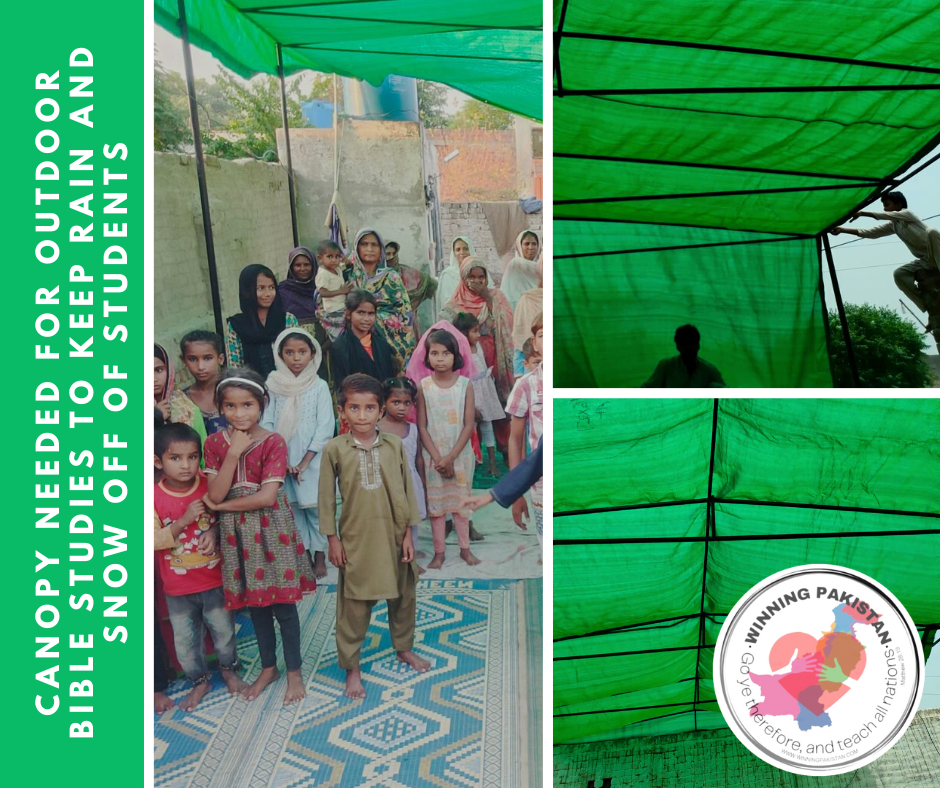
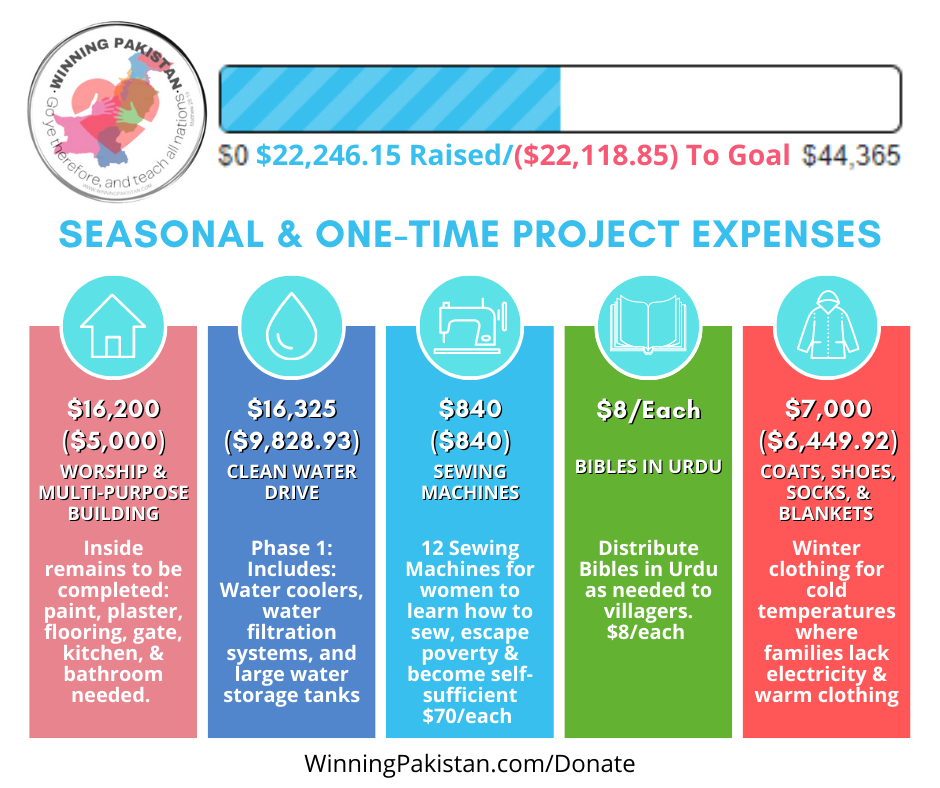
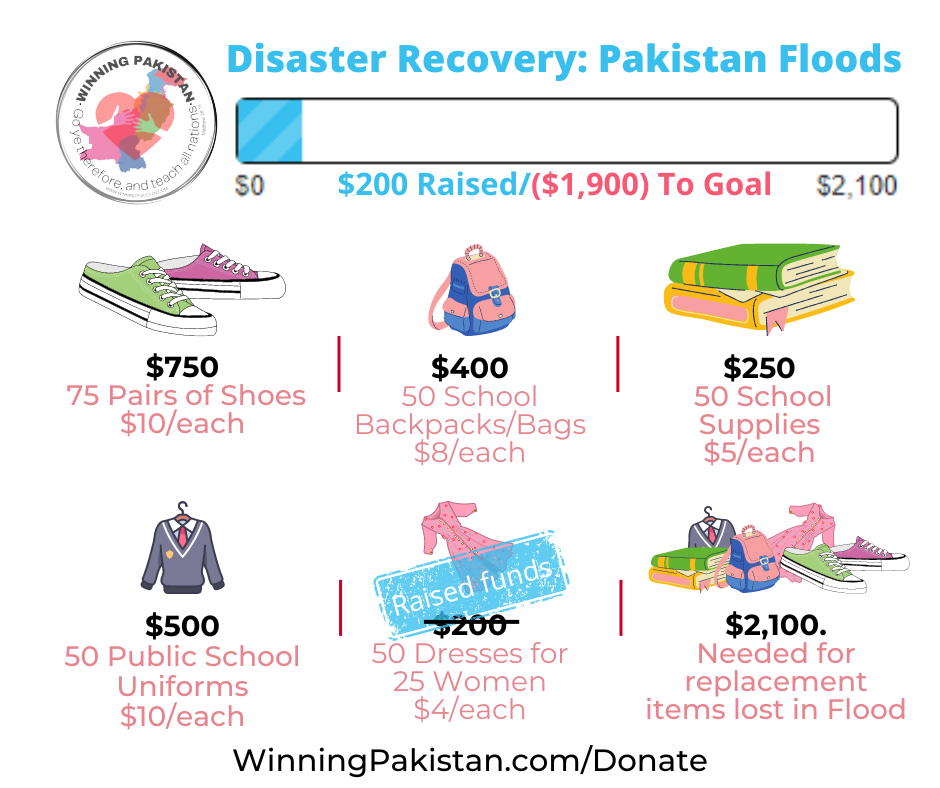

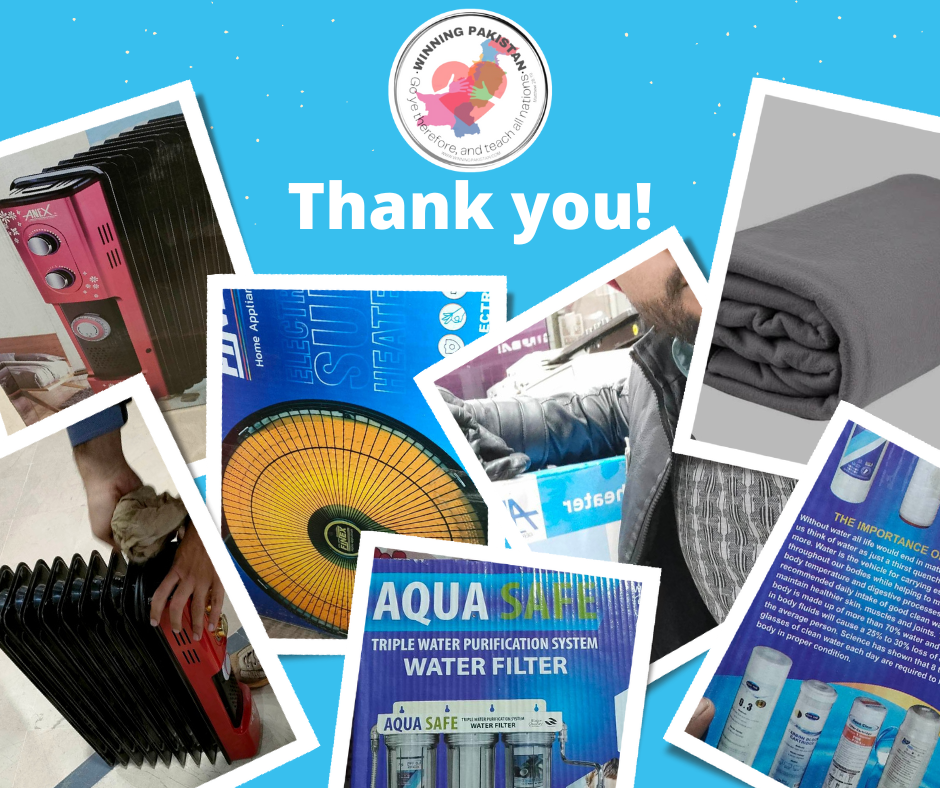
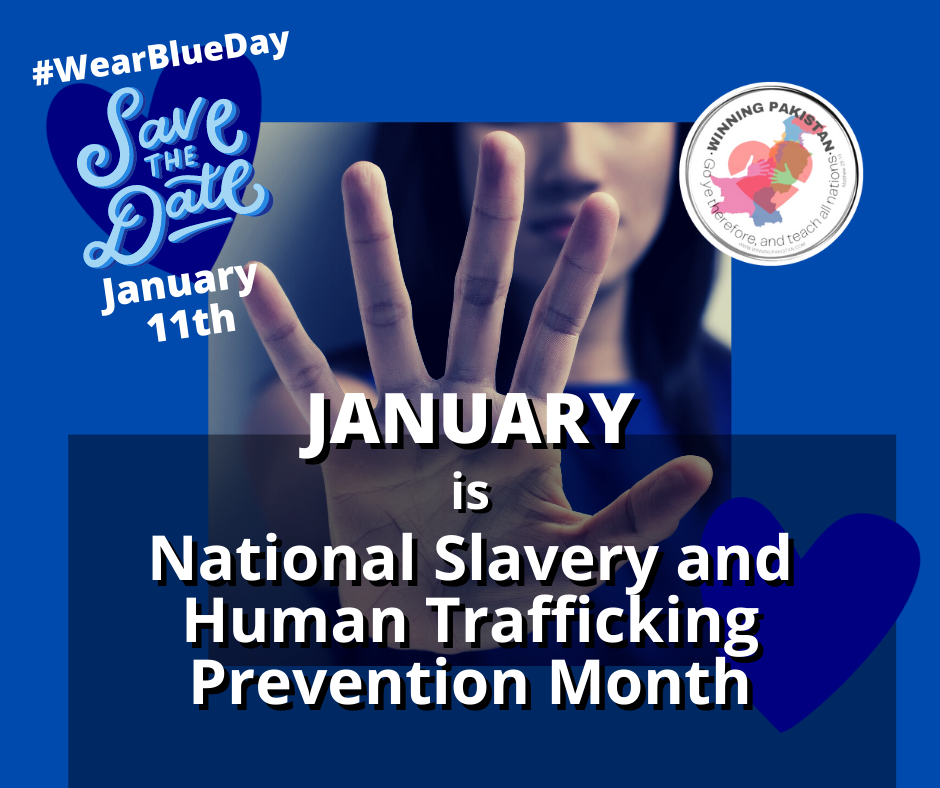
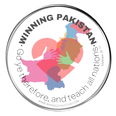

 RSS Feed
RSS Feed
